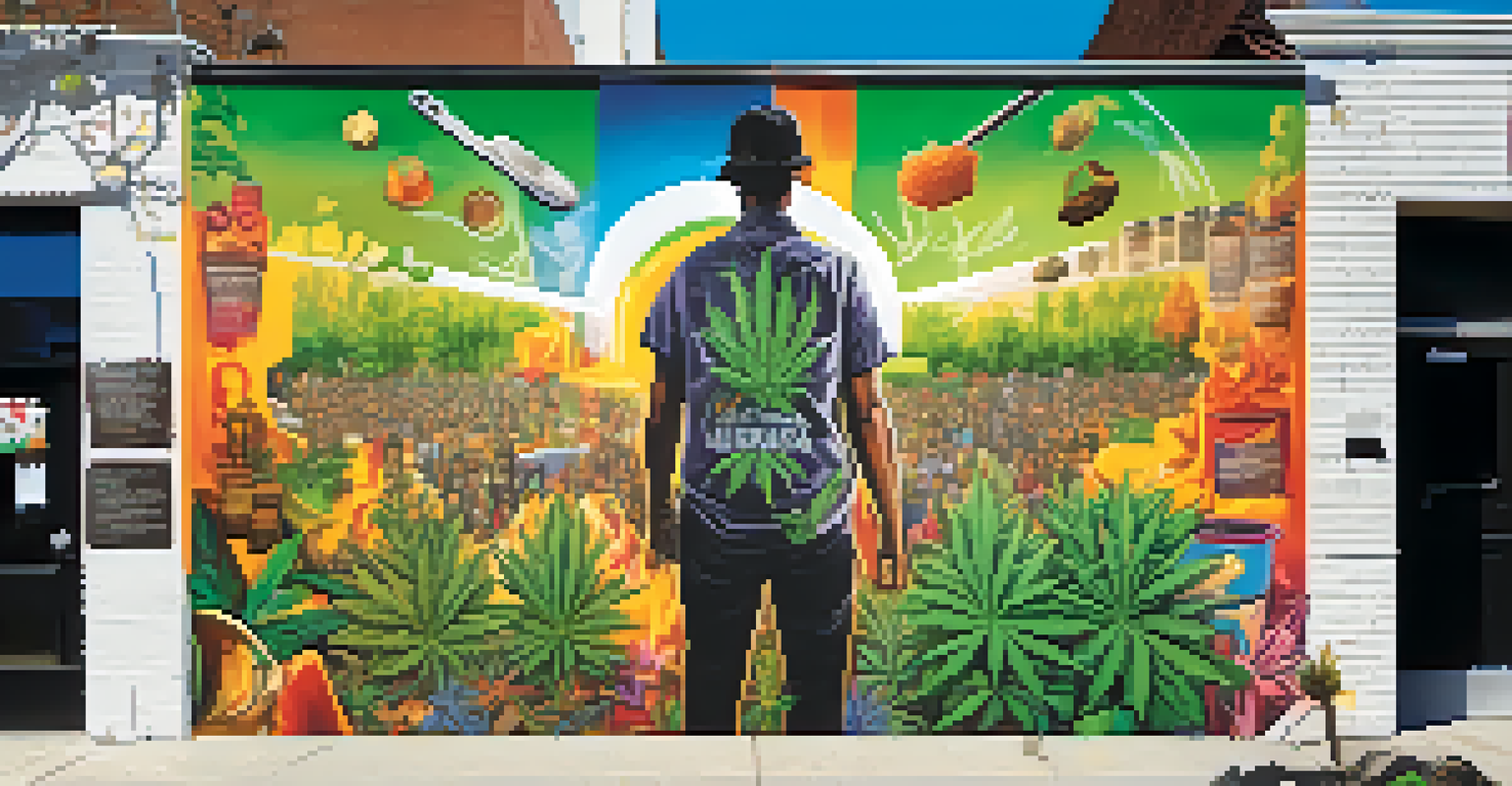The Role of Media in Shaping Marijuana and Mental Health Stigma

Understanding the Intersection of Media and Mental Health
Media plays a crucial role in shaping public perceptions, especially regarding complex issues like mental health and marijuana use. From news articles to social media posts, the narratives presented can significantly influence how these topics are viewed. For instance, sensationalized stories about marijuana-related incidents can perpetuate negative stereotypes about users, linking them to mental health problems.
Media can shape perceptions and influence the stigma surrounding mental health and substance use.
This media portrayal often oversimplifies the relationship between marijuana and mental health, ignoring scientific studies that suggest potential therapeutic benefits. When the media highlights only the negative aspects, it can contribute to a stigma that discourages individuals from seeking help or discussing their experiences openly. As a result, the conversation around mental health becomes polarized, making it challenging to address the nuances involved.
Moreover, the representation of mental health in the media can also affect how society views individuals who use marijuana for medicinal purposes. If the media continues to focus on negative narratives, it risks marginalizing those who may benefit from such treatments, further entrenching stigma. This creates a cycle where misinformation breeds fear and misunderstanding.
How News Coverage Influences Public Opinion on Marijuana
News coverage often sets the tone for public opinion on marijuana, especially as more states consider legalization. When major outlets report on marijuana in a negative light, they can reinforce existing fears and biases about its effects on mental health. For example, headlines that link marijuana use to increased rates of anxiety or psychosis can lead to widespread alarm and misunderstanding among the public.

Conversely, positive news stories about marijuana's potential medical benefits can help shift perceptions. When the media highlights successful case studies of patients using marijuana to manage symptoms of conditions like PTSD or depression, it opens up a dialogue about its uses. This kind of coverage can lead to greater acceptance and understanding, but it often requires a concerted effort to present balanced viewpoints.
Media Shapes Perceptions of Marijuana
Media narratives significantly influence public opinions on marijuana and mental health, often reinforcing stigma through sensationalized reporting.
Ultimately, the way news is framed can either contribute to stigma or help dismantle it. A more responsible approach to reporting on marijuana and mental health could help educate the public, fostering a more informed perspective that encourages dialogue and understanding rather than fear.
The Role of Social Media in Shaping Stigma
Social media has become a powerful tool in shaping public opinion, particularly among younger audiences. Platforms like Twitter, Instagram, and TikTok allow for rapid dissemination of information, but they can also spread misinformation just as quickly. Memes or viral posts that portray marijuana use negatively can perpetuate stigma, leading to harmful stereotypes about users and their mental health.
The stories we tell about mental health can either build bridges or create barriers.
Conversely, social media can also serve as a platform for advocacy and support. Many individuals and organizations use these channels to share personal stories about their experiences with marijuana and mental health, helping to humanize the conversation. This grassroots movement can challenge mainstream narratives and encourage more open discussions about the complexities of marijuana use and its effects on mental health.
The duality of social media means it can either reinforce stigma or help dismantle it, depending on how users engage with the content. As more individuals share their stories and advocate for their rights, social media can become a space for education and awareness, ultimately fostering a more nuanced understanding of these issues.
Impact of Entertainment Media on Perceptions of Marijuana
Entertainment media, such as films and television shows, often depict marijuana use in various ways, influencing public perceptions significantly. Comedies might portray stoners as lazy or irresponsible, which can reinforce negative stereotypes about users. These portrayals can lead to societal stigma, making it difficult for individuals who use marijuana, whether recreationally or medicinally, to be seen in a positive light.
However, there are also examples of entertainment media challenging these stereotypes. Some shows and films depict characters who use marijuana responsibly, highlighting its role in managing stress or anxiety. By presenting more balanced representations, these narratives can help shift public opinion and reduce stigma surrounding both marijuana use and mental health issues.
Social Media's Dual Role
Social media can either perpetuate stigma through negative portrayals or foster understanding by sharing personal stories and advocacy.
The challenge lies in the fact that many viewers may not differentiate between fiction and reality. Engaging storytelling can have lasting effects on how people perceive marijuana and those who use it, potentially leading to a more informed understanding—or deepening existing prejudices.
The Influence of Celebrity Culture on Marijuana Perceptions
Celebrity endorsements and personal stories about marijuana use can significantly impact public perceptions. When a beloved figure openly discusses their positive experiences with marijuana, it can help normalize its use and reduce stigma. For example, celebrities like Snoop Dogg and Miley Cyrus have openly embraced marijuana culture, which can influence their fans’ views on its acceptance and potential benefits.
However, the influence of celebrity culture is a double-edged sword. While some might advocate for responsible use, others may glorify excessive consumption, which can perpetuate harmful stereotypes. This inconsistency in messaging can confuse audiences, especially younger individuals who are still forming their opinions about marijuana and its relation to mental health.
Ultimately, the impact of celebrity culture underscores the importance of responsible representation. Celebrities have the power to shape narratives, and their influence can either contribute to stigma or help foster a more understanding and informed perspective on marijuana and mental health.
The Importance of Responsible Media Representation
As we explore the role of media in shaping stigma, it becomes clear that responsible representation is crucial. Media outlets have a responsibility to portray marijuana use and mental health issues accurately, showcasing the complexities involved. This includes highlighting research that supports the benefits of marijuana for certain mental health conditions while also acknowledging potential risks.
When media representatives choose to focus solely on sensational stories or negative portrayals, they contribute to a culture of stigma that can have real-world consequences. Individuals may feel ashamed or afraid to seek help for mental health issues or to discuss their marijuana use openly. By fostering understanding and empathy through responsible reporting, the media can play a pivotal role in breaking down these barriers.
Need for Responsible Representation
Accurate and responsible media representation is essential for breaking down stigma and encouraging open discussions about marijuana and mental health.
Engaging in responsible representation means not only presenting facts but also humanizing the issues at hand. By sharing diverse perspectives and real-life stories, the media can help to create a more informed public that is better equipped to understand the nuances of marijuana use and mental health.
Encouraging Open Dialogue About Marijuana and Mental Health
To combat the stigma surrounding marijuana and mental health, open dialogue is essential. Encouraging discussions in various media formats, from podcasts to panel discussions, can help normalize these conversations. By providing platforms for individuals to share their experiences and insights, we can create a more supportive environment for those grappling with these issues.
Moreover, engaging experts in the field—such as mental health professionals and researchers—can provide valuable information that challenges misconceptions. When credible voices contribute to the conversation, it not only lends authority to the discussion but also helps educate the public on the complexities of marijuana's effects on mental health.

Ultimately, fostering an environment where open dialogue is welcomed can lead to greater understanding and acceptance. As stigma decreases, individuals may feel more empowered to seek help, share their stories, and advocate for their needs, creating a cycle of support and awareness.